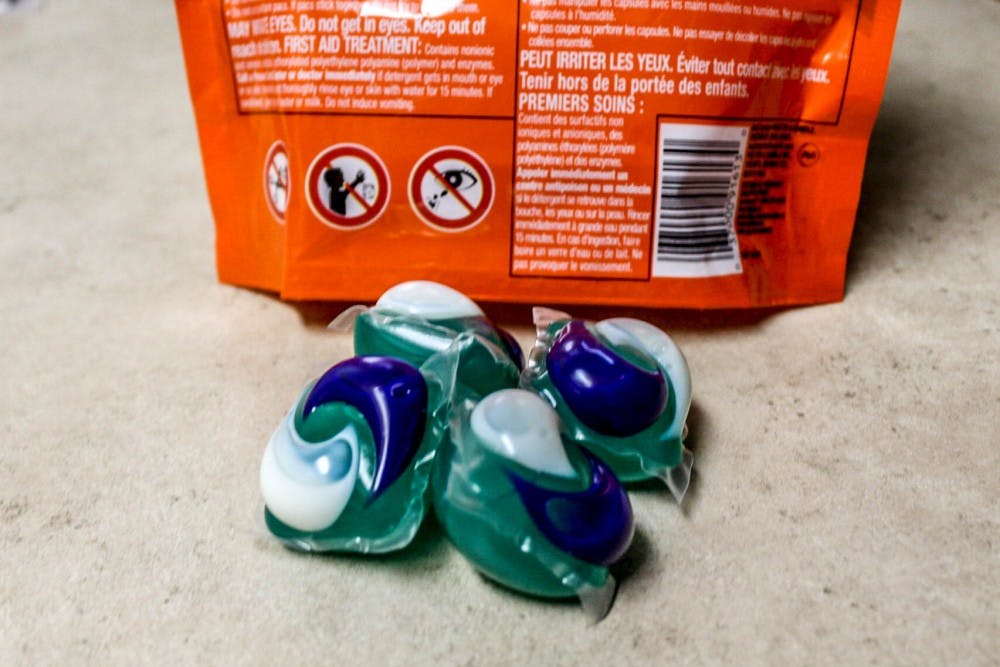Jade Olusoji, a freshman pharmacy major, doesn’t know anyone who’s eaten laundry detergent pods but has seen jokes about it online.
From videos of people biting into pods to pictures mocking the pods’ eye-catching colors, she has seen the memes become an internet challenge.
“I would joke about this with my friends, but more of the fact that the challenge is so absurd, not that we would actually do it,” Olusoji said. “I hope I don’t have any friends that would eat a Tide Pod but if they did, I would honestly be shocked.”
The “Tide Pod Challenge,” a recent trend where participants consume laundry detergent pods, gained significant traction after tweets from @littlestwayne and @fastjellyfish alluding to eating the pods were liked by over 10,000 users in December 2017.
Videos depicting social media users consuming the pods, sometimes referred to as the “Forbidden Fruit,” have made their rounds as well, along with pictures of pods being cooked onto pizzas.
In recent weeks, Tide’s creator Procter and Gamble has released a statement and a commercial starring Rob Gronkowski, warning individuals not to consume the product.
Students like Jake Feerick, a senior applied mathematics major, thinks these reactions to the challenge have increased its popularity.
“I don’t know anyone who has done the challenge so it almost seems like the meme is the fact that YouTube takes down these videos and Tide has to say a seemingly obvious thing that most normal people don’t think is an issue but it actually can be an issue because the pods look like candy,” Feerick said.
The laundry packages are filled with chemicals which, when consumed, can cause mild upset stomach but can result in pulmonary edema and respiratory arrest, according to the American Association of Poison Control Centers (AAPCC). In studies done in 2012 on clinical characteristics after pod exposure, the Center for Disease Control reported cases of nausea, vomiting and eye irritation in young children.
In the past two years, data collected by the AAPCC reveals that cases involving intentional usage of packets and pods increased significantly. In 2016 and 2017, 53 cases were handled by poison centers in the 13-19 year old age group. As of January 31, 134 cases have been reported in the age group this year.
“Since our first alert to this life-threatening activity, the trend of intentionally ingesting single-load laundry packets has increased in its popularity despite repeated warnings,” Stephen Kaminski, AAPCC CEO and executive director, said in a press release. “We cannot stress enough how dangerous this is to the health of individuals—it can lead to seizure, pulmonary edema, respiratory arrest, coma, and even death.”
Michele Caliva, administrative director of the Upstate New York Poison Center (UNYPC), has received 24 calls regarding laundry detergent pod exposures this year, as of January 26. Nineteen of those calls were accidental and involved children. The rest of the calls, however, involved intentional exposures by teenagers and adults. Caliva said centers across the country, including her own, are concerned about the trend’s effects.
“It has grave potential associated with it and people have seen cases but overall, it’s very stupid and very disconcerting,” Caliva said.
Caliva said most of the calls before this year involved small children, who accidentally ingested laundry pods due to their candy-like appearance. In 2017, UNYPC received 224 calls, with three being intentional and 185 involving children under six. Caliva suggests if an individual ingests a laundry pod –– intentional or not –– they should avoid drinking liquids to counter the consumption.
“The more fluids you drink, the more apt you are to vomit,” Caliva said. “The more apt you are to vomit, the more apt you are to aspirate and get it into your lungs.”
Feerick thinks college-aged students should have no reason to consume pods but companies like Tide should make less colorful pods in the future.
“I don’t know the chemistry behind it but they’re pretty colors on the packages,” Feerick said. “In terms of the meme though, I think it’s time for another meme to take over. Maybe people could actively not share Tide Pod memes.”
If you or someone you know has ingested a laundry pod and packet, you can contact the national Poison Help hotline at 1-800-222-1222. Individuals can also save poison control contact information in their phone by texting “POISON” to 797979.
Benjamin Blanchet is the senior features editor and can be contacted at benjamin.blanchet@ubspectrum.com.

Benjamin Blanchet is the senior engagement editor for The Spectrum. His words have been seen in The Buffalo News (Gusto) and The Sun newspapers of Western New York. Loves cryptoquip and double-doubles.





